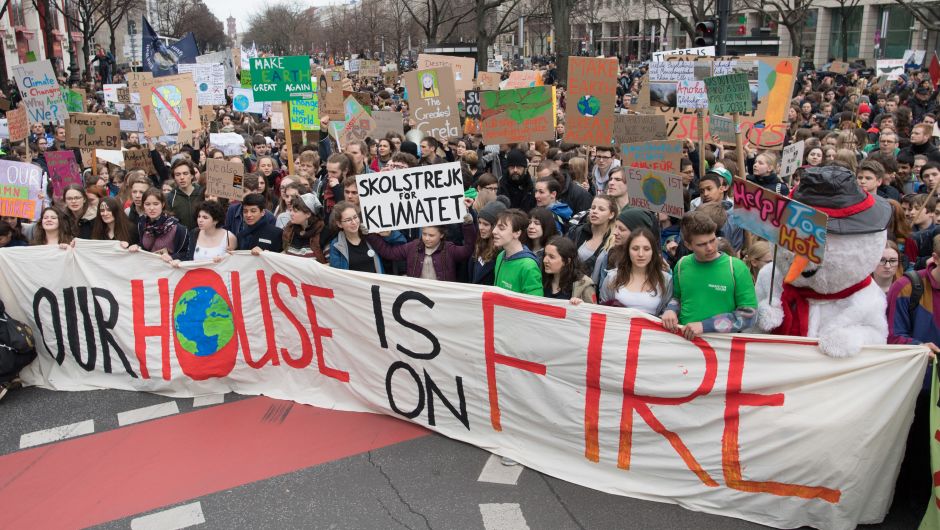Perubahan Iklim
Climate Policy Needs More Market Economy

Climate targets must be asserted. This requires no moral sermons and no radical change in lifestyle but hard guidelines and market-based instruments. Both are possible, write Ria Schröder and Karl-Heinz Paqué in a guest commentary for Die Welt.
Greta has become an icon of climate rescue. And she has so motivated students all over the world to protest politically. That is good because the failure of politics is blatant. There is a giant gap between the climate goals that were adopted with a grand gesture in Paris in 2015 and the concrete steps to achieve them. Though there exists no shortage of moral sermons that we all have to change our way of life – away from the car to the bike, from meat to a vegetable diet, from plastic bags to gunnysacks. But how those actions actually affect the climate balance remains unanswered.
The interim result for Germany in 2019 is devastating in any case, despite a slight improvement in the recent past. Because the emission of greenhouse gases is far too high to reach the self-imposed goals for 2020 and probably also for 2030. Nevertheless, this output is the central strategic set screw: When even a large ecology-conscious nation such as Germany does not succeed in achieving the agreed goals, it would be an illusion to believe that they could be achieved globally.
Politicizing instead of privatizing climate protection
So how do we rescue the climate? “Through innovation and competition – and not by changing the individual lifestyle”, the green thought leader Ralf Fücks recently wrote for Spiegel Online. He is completely right with this liberal message: We must take the climate goals inexorably serious and have to align political actions accordingly. Fücks continues: “It is fundamentally wrong to privatize the ecological question instead of politicizing it.”
So let’s politicize! Most crucial is the adherence to the agreed climate targets of the Paris Convention in 2015 which provides for a limitation of global warming to a maximum of two, better 1,5 degrees Celsius. This must be done in particular by reducing the emission of greenhouse gases, above all CO2. For this, we need a clear framework. Legislators must set strict limits for the emission of climate-damaging emissions - and must simply not allow more.
The way is actually well-known and has a name: emission certificate trading. Every company that emits CO2 is only allowed to do so if it has purchased emission allowances in the form of certificates. Who emits more has to pay more. Those who save emissions through innovations, on the other hand, pay less. The certificates are traded on a stock exchange and reduced year by year.
Right answer to Greta and the protests
So the price increases over time, even drastically with high economic growth. As a result, there is a strong economic incentive to save emissions and seek new solutions through research and development. Only those who cannot do so, or only at extremely high costs, will remain as buyers of the rights or eventually disappear entirely from the market with their (ecologically questionable) products.
To some extent, this approach is already realized: in the European Union Emissions Trading System, short EU-ETS. Unfortunately, only to some extent though. The right answer to Greta and the protests of the students is the fundamental renewal and expansion of the EU-ETS. It is essentially about five guidelines of the reform:
- All sectors of the economy, not only the energy industry and parts of the economy as before, are participating in the EU-ETS. This applies in particular to the traffic, the building and the heating industries as well as agriculture and forestry, which account for a large part of CO2 emissions.
- National unilateral measures - as has been customary in German energy policy - no longer exist. Of course, the best possible solution would be a global solution, but even a consistent implementation in Europe could already be a huge step forward and become a global model.
- Revenue from the issuance of CO2 emission rights does not flow into the general budget but is either invested in research about climate technologies and/or returned to citizens through tax cuts.
- Research funding for new technologies will be increased drastically and designed to be as technology-neutral as possible. The innovative competition between different solutions for CO2 prevention shall hereby be promoted.
- The research will be extended to the reuse and the natural and biological storage of CO2. Also, adaptions to climate change, which will be inevitable within limits, are increasingly being investigated by science.
It’s clear that even if these guidelines are accepted, there is still scope for further controversy. Which technologies should be explored – preferably those like electromobility, where rapid progress can be expected but lasting sustainability is in question? Or those technologies that could promise long-term success, such as green hydrogen, but are still far from being ready for production? Well, about these questions we then have to argue in society and in the Parliament - committed, hard and passionate. However, we should not argue anymore about limits for CO2 emissions and the trading of emission rights.
The young generation rightly demands a sustainable policy on climate protection issues as well as on education, pension, and national debt. Let us take advantage of the impulse they deliver – like fifty years ago after the 1968 movement. It is time to act.
---------------------------------------------------------------------------------------------------------------------
The original article is written in German and can be found here online.
The guest commentary was first published on Friday, 12th April 2019, in Welt and can be found here online.
Ria Schröder is chairwoman of the “Jungen Liberalen” (Young liberals) | Twitter: @ria_schroeder
Karl-Heinz Paqué is chairman of the Friedrich Naumann Foundation For Freedom | Twitter: @KH_Paque